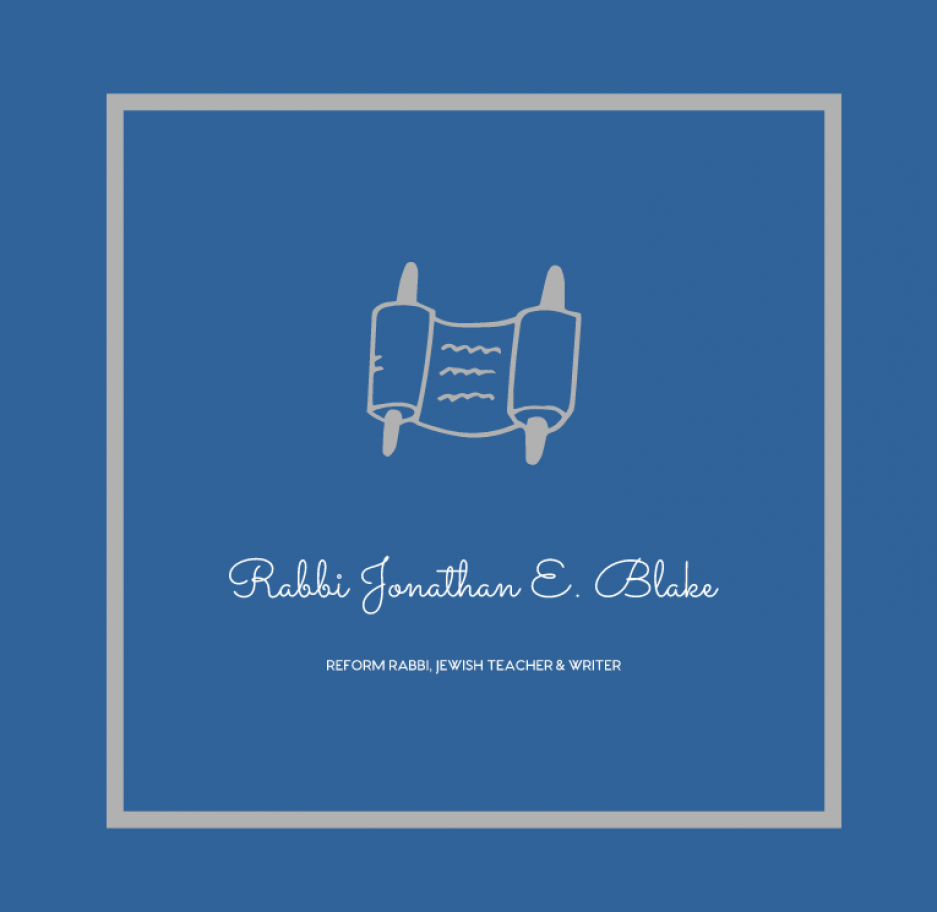The Angle of Your Tent, and Why it Matters
Rabbi Jonathan Blake, Westchester Reform Temple, Scarsdale, NY
Confirmation Class of 5780!
Well. This is weird.
Let me begin my remarks this morning by acknowledging that I am fully aware that you’ve been texting each other and using the Zoom Private Chat feature this whole time, just outside the view of the camera.
To which I say, just remember what the Torah says: Two can play at that game. What, you think your rabbis and cantors haven’t been doing the same exact thing?
Anyway. Let me share with you an interesting observation about Zoom, derived from from the Babylonian Talmud.
The Talmud mentions that, when they camped in the wilderness, the Israelites positioned their tents at an angle so that people couldn’t look into their neighbors’ homes.
I wonder what would’ve happened if they had Zoom.
Because on Zoom, it doesn’t matter what angle your house sits at. Everybody is checking out everybody else’s homes. All of a sudden, our placid, friendly neighborhood has become a bastion of voyeurism, all thanks to Zoom.
Come on. Admit it. You’ve all done it. You’re probably doing it right now.
Like, you’re on a Zoom with friends…. And you just can’t help yourself. You start looking around their bedrooms, like, whoa, what do they have that I haven’t got?
Or, maybe, you’re putting up a virtual screen, so other people can’t look into your room, because you just know they’re checking out your room, too…. Right?
So, that’s a thing we’ve all been doing.
Which takes us to a line in this morning’s Torah portion, which Sam Medvinsky so beautifullychanted:
Exodus 20:14
לֹ֥א תַחְמֹ֖ד בֵּ֣ית רֵעֶ֑ךָ לֹֽא־תַחְמֹ֞ד אֵ֣שֶׁת רֵעֶ֗ךָ וְעַבְדּ֤וֹ וַאֲמָתוֹ֙ וְשׁוֹר֣וֹ וַחֲמֹר֔וֹ וְכֹ֖ל אֲשֶׁ֥ר לְרֵעֶֽךָ׃
You shall not covet your neighbor’s house. You shall not covet your neighbor’s wife, nor his servant, whether male or female, nor his ox, his donkey, or anything that belongs to your neighbor.
That’s the 10th commandment. The last commandment. And also, I think, the weirdest commandment, because it’s the only one that tells you what to feel or not to feel, and not what to do or not to do.
At the same time, it may also be the most relatable commandment, the one most in touch with the human psyche. I mean, most people I know don’t ordinarily contend with the temptation to steal or to murder, but they do have to contend with the 10th Commandment, the one that says, “You shall not covet.”
Confirmation Class of 5780, you can all relate to the 10th Commandment.
Well, the starting part and the ending part of it, anyway. You guys do have houses, but no servants, wives, or donkeys. At least not yet. So, let’s just abbreviate the Tenth Commandment as, “You shall not covet your neighbor’s house,” dot dot dot, “Or anything that belongs to your neighbor.” That, I think, we can all wrap our heads around.
But what is this commandment really about?
First, what the 10th commandment is NOT about:
It’s not about craving. Everyone has cravings, just naturally. “I want a pizza.” Just wanting something is not a problem in and of itself.
Nor is the commandment about wanting what “everybody else” has, or seems to have, something akin to “FOMO,” Fear Of Missing Out: “Wow, everyone else in this restaurant already seems to have gotten their pizza; I really want my pizza.” Also, totally fine. Normal. Natural. Understandable.
No, what the 10th commandment is trying to say, is that David Appel can’t just say, “I want, specifically, Audrey Gendel’s pizza. Maybe I should take it.”
This is a very specific kind of craving – wanting what does not belong to you, what you have no right to.
You can want any pizza on the menu, but Audrey also has a right to enjoy her pizza without looking over her shoulder the entire time she’s eating it, worrying about what David is up to.
Acknowledging all of this, I want to add here my own conclusion that there’s no comprehensive way for us not to want what others may have. It’s pretty natural, pretty widespread, pretty human nature-ish. You can’t just stop your heart from wanting what it wants.
We may never be able to suppress these urges, these desires, at least not entirely, at least not forever. I think that they may have put this commandment last of Ten because they knew it was the most likely to be broken.
That doesn’t mean there’s nothing to be done, that we are all hopelessly burdened by our own human frailty. It is true that desire, craving—even that which belongs to our neighbors—exists everywhere, and yes, it exists very much here in our community, or so I am led to believe.
But there also exists a counteracting force that we can actively bring into our lives. It’s called Gratitude. Contrary to what you may think, Gratitude is not inborn; it is learned. Gratitude is not a feeling; it’s a practice.
Back, for a moment, to those Israelite tents, each one pitched at an angle, so that neighbors could not see into each others’ homes:
The passage in the Torah from which this observation derives is one with which you may or may not be familiar.
In the Book of Numbers, an enemy king summons a sorcerer named Bil’am to curse the Israelites. Bil’am shows up for the job, stations himself on a hilltop, along with his sinister employer, gets ready to curse the Israelites who are encamped down at the base of the hill, gazes down on their tents, and, unexpectedly, and much to his employer’s chagrin, his curse comes out as a blessing—one of the most famous blessings in Jewish tradition. מַה־טֹּ֥בוּ אֹהָלֶ֖יךָ יַעֲקֹ֑ב מִשְׁכְּנֹתֶ֖יךָ יִשְׂרָאֵֽל, says the seer. “How good are these tents of Jacob, these dwelling places of Israel!”
What made these Jewish tents “good,” says the Talmud, is that the sorcerer immediately recognized, from the angle of the tents, that nobody was looking into anyone else’s tent.
When we don’t care all that much about looking into our neighbor’s tents, when we stop caring, that’s exactly when we are able to say, “Ma Tovu” about our our own tents.
And, vice-versa: If we remember to look around our own tents and acknowledge what makes them “good,” we stop caring about what’s in everyone else’s tent—even if just for a few moments. The two concepts go hand-in-hand: Gratitude for what I have; not coveting what my neighbor has.
Confirmation Class of 5780: none of us denies that this milestone moment comes laden with accumulated losses. We had hoped to celebrate Confirmation in Westchester Reform Temple’s beautiful sanctuary, with the whole class singing in unison, accompanied by piano and guitar, wearing robes, carrying flowers, standing side-by-side, enjoying a sumptuous luncheon together afterwards. We had hoped to remove a Torah scroll from our holy Ark and chant the ancient words from its timeworn parchment.
You had hopes, too: of in-person classes at temple and at school, of athletic play and competition, of chorus and band and drama club, of happy milestones with family and friends, of big Passover Seders and Memorial Day Cookouts and end-of-year parties. I do understand how loss upon loss contributes to longing upon longing, longing for what might have been, longing for what we wish we had that we do not have.
At the same time, our losses require a context in which to understand them. After all, little more than a few months ago, we never could have fathomed numbers like: 5 million confirmed infections, over 300,000 dead—100,000 of them, Americans—41 million unemployed. I am sure that all over our country and our world there are people looking at their neighbor’s houses, as it were, coveting a hot meal, a warm bed, a now-absent loved one to care for them, a job to get up for in the morning.
And so, Gratitude. Gratitude as a discipline, not a feeling. Gratitude as a daily practice, not a spontaneous experience. Gratitude as something you do by yourself, for yourself, not the reflexive saying of “Thank You” when someone does something nice for you.
May I suggest, Confirmation Class of 5780, bringing into your daily routines, a quiet moment for a prayer of gratitude? Let me qualify the word “prayer.” You don’t need to know any Hebrew; you don’t even need words. You don’t need to believe in God; you don’t really need to “believe in” anything. You just need to take a moment to get in touch with one thing in your life that you can acknowledge with a heart full of thanks.
And let me qualify that, too: not just a thing. I mean statements like this:
“Today I helped my little brother with his homework. I have the gift of knowledge that I can share with others.”
“Today I was able to help without being asked. I live in a home, in a community, where by abilities, opinions, feelings, and contributions are valued.”
“Today I was in my back yard, and I noticed that I am connected to a vast ecosystem of living things. Amazing!”
And so on.
We all may just find that such a daily practice will make us so much the more aware of all the good in these, the tents of our People, so that we might proclaim, together:
מַה־טֹּ֥בוּאֹהָלֶ֖יךָיַעֲקֹ֑במִשְׁכְּנֹתֶ֖יךָיִשְׂרָאֵֽל
“How good are these tents of Jacob, these dwelling places of Israel!”
May God bless you, Confirmation Class of 5780: you, together with all the people who share your tent.
And May God keep all of our tents safe and well until we can meet again, and embrace.
Mazal Tov and Chag Sameach!

